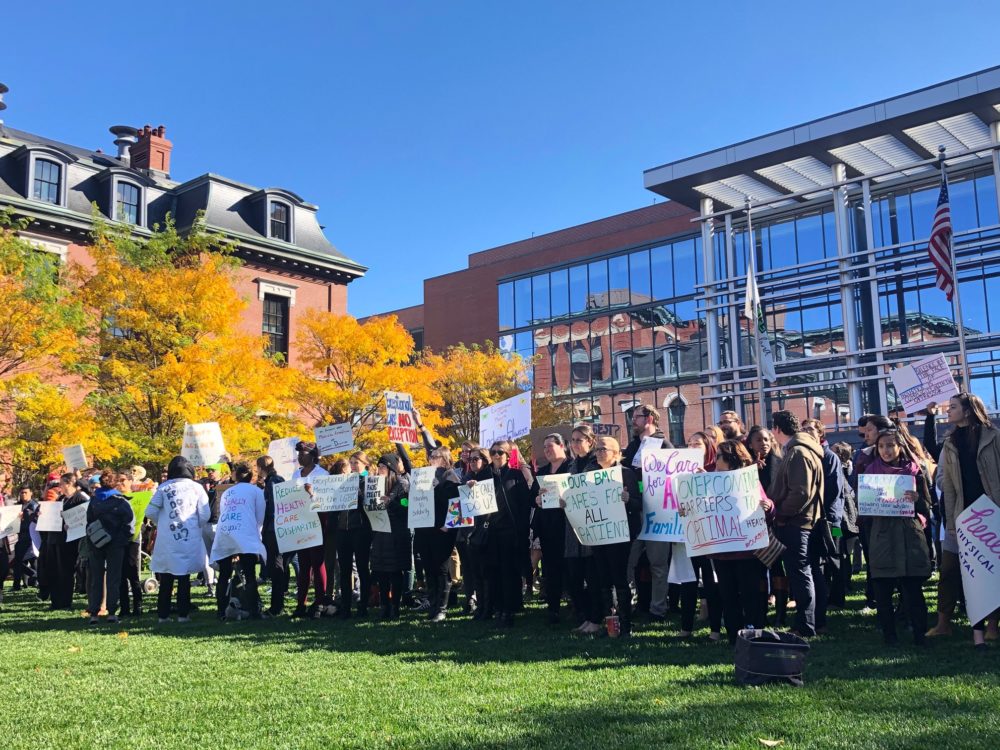Advertisement
Why Some Boston Doctors Are Taking Up Immigration Advocacy

A silent protest staged earlier this month outside of Boston Medical Center drew hundreds of BMC employees, as doctors, nurses and other health care providers scrawled messages on white lab coats and held posters that said things like, "More hospitals, less cages."
Boston-area health care providers are increasingly finding themselves in the middle of the Trump administration's crackdown on immigration. New policy proposals and partisan politics are combining, making it more difficult for immigrant patients to access health care and in turn, leading more physicians to push back.
The BMC demonstration was organized in protest of a visit from first lady Melania Trump.
"We're here standing in solidarity with our patient population and the communities in which we work here in Boston to show that we are not complicit in the fact that our organization was invited to have the Trump administration here," said Erica Pike, a program manager at BMC who stood alongside her colleagues.
The first lady was visiting a program for infants born with opioid dependencies, but several BMC workers at the protest worried her visit sent the wrong message to the very patient population BMC serves — namely nonwhite and immigrant communities.
Sarah Kimball is a primary care physician and the co-director of the Immigrant and Refugee Health Program at BMC, which is the area's largest safety net hospital, which means it treats patients regardless of insurance coverage or ability to pay.
"Every day in my clinic, I see how the current political climate toward immigrants has dire health consequences," Kimball said. "I mean, our patients are really living with the effects of politics in their minds and in their bodies, and that's certainly something that we've seen ramped up in the last few years."
The Massachusetts Medical Society adopted a resolution last year focusing on access to health care for immigrants. The measure encourages providers to oppose the presence of immigration enforcement at health care facilities -- a common fear that can lead immigrants to skip appointments or avoid scheduling them altogether.
Advertisement
Health care facilities are recognized by U.S. Immigration and Customs Enforcement (ICE) as sensitive locations, which means the agency generally avoids making arrests on site. But there are no laws that actually prevent the agency from doing so.
... Our patients are really living with the effects of politics in their minds and in their bodies, and that's certainly something that we've seen ramped up in the last few years."
Sarah Kimball, co-director of the Immigrant and Refugee Health Program at BMC
On another issue, the medical society feared changes to the so-called public charge rule could penalize vulnerable immigrants for using Medicaid and food assistance — as many as half a million in Massachusetts, by one estimate.
Fiona Danaher is a pediatrician at Massachusetts General Hospital's Chelsea HealthCare Center, where she cares for a primarily immigrant population.
"I think so many people are seeing how the anti-immigrant rhetoric is affecting their patients and want to learn more about what they can do, so we have just been seeing this almost grassroots movement within the physician community," she said.
Danaher is increasingly invited to speak about the role of physicians as advocates. On a recent Sunday, she was teaching a workshop on the topic to medical students from across the country. And, in September, she was invited to speak in front of Congress, testifying on behalf of patients living in the U.S. with medical deferred action, a process that offers protections against deportation so immigrants can receive medical treatment in the country.
Danaher said she's accustomed to helping individual patients beyond the normal scope of medical care, including guiding them to housing resources or supplemental food assistance. But over the last few years, her advocacy has taken on a broader meaning — especially when it comes to addressing the root causes of what's ailing many of her immigrant patients.
"I can prescribe an anti-depressant, but if I can't solve the problem that is making that patient depressed, then what good am I really doing in the long run, right? So, I think many physicians are feeling the same way right now and they want to do something to address the underlying issue," she said, "what we call the social determinants of health. And immigration status, unfortunately, is increasingly becoming a social determinant of health."
Kimball, the BMC doctor, said advocating for core principles like health equity has always been integral to her own role as a doctor. The idea that immigration status should not dictate a person's health is one of the reasons BMC founded its immigrant health center.
But, she said, this mission is increasingly more challenging under the Trump administration, due in large part to the sheer number of proposed immigration policies that interact with health on some level.
"Some of this is about stretching the bounds of what we think health care needs to tackle," Kimball said. "You know, in our setting, we realized that we couldn't address people's health care needs without addressing their immigration legal needs."
Advocacy, Kimball said, doesn't always mean writing an op-ed or speaking at a press conference. Sometimes, she said, it's as simple as asking a patient, "How are you doing?"
This segment aired on November 20, 2019.
